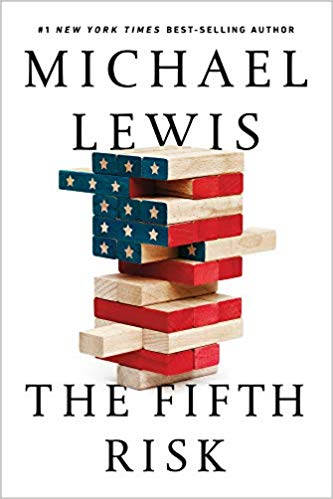Here’s a book to put on your short list: The Fifth Risk by Michael Lewis.
I’ve now read a number of books (somewhere between four and six, depending on how you categorize them) about the Trump campaign and presidency–by celebrated authors (Bob Woodward) and sarcastic geniuses (Matt Taibbi) and lesser-light authors and scribes. It was a weird, unprecedented campaign and an appalling, slapdash start to a presidency–everyone from Michael Wolff to Katie Tur to Chris Christie says so.
But this is the best book I’ve read, by a long chalk. It’s barely political, focusing on the present, rather than the campaign, the Russian interference, or the 2020 election. It is, however, a blood-chilling account of just what it might eventually mean, in terms of human lives and well-being, that our country is being–What? ‘Run’ isn’t the right word, nor is ‘managed.’ That our government has been taken over by a cabal of unqualified, loutish and greedy people who are in the process of dismantling decades, centuries even, of government policy that works. Just because they can.
Lewis is his usual cynical and incisive self, and the stories he presents are interesting–case studies of how the government protects people and nurtures innovation and provides basic information to make lives and livelihoods better, everything from safe energy to nutrition to the weather. The government is not perfect, or even close, of course, but it’s served us reasonably well for a couple hundred years.
Bye-bye to all that. Reading this book was the first time I considered just how much has already been undone and what some of the long-term consequences might be. Lewis has NOT written a polemic–just an inside peek at things we aren’t considering, because we’re so distracted by this administration’s behaviors, antics and moral failings.
If you’re one of those people who thinks the government is nothing but embedded corruption, you especially ought to read this book, as Lewis steps back from the spotlight and looks at a few less obvious things the government does, to keep us safe, healthy and informed—and to keep the lights on.
Among Lewis’s fascinating subjects is John MacWilliams, who was the Chief Risk Officer at the Department of Energy during the Obama administration. It’s MacWilliams who lists what he thinks are the five biggest risks America is facing. The first four: Nuclear weapons and waste, North Korea, keeping Iran from building a nuclear bomb, and the shaky, vulnerable patchwork that forms our electrical grid.
The fifth risk is program management. Here’s Lewis, explaining what that means:
“The risk a society runs when it falls into the habit of responding to long-term risks with short-term solutions. … ‘Program management’ is the existential threat that you never really even imagine as a risk. … It is the innovation that never occurs and the knowledge that is never created, because you have ceased to lay the groundwork for it. It is what you never learned that might have saved you.”
Lewis looks at the Departments of Energy, Commerce and Agriculture, beginning with the fact that the Trump administration was—to put it mildly—utterly unprepared to staff agencies and develop policy. He makes the work these federal agencies do fascinating—no easy task—and gives long-time government employees a pat on the back for a whole lot of behind-the-scenes work that goes completely unrecognized until it’s gone. Which is precisely the situation we’re facing—loss of essential services due to short-term thinking and deliberately installed incompetence.
As a teacher, I would have to say that no Secretary of Education has ever drawn as much attention and loathing as Betsy DeVos. No surprise to this lifelong Michigander who was introduced to the DeVos family in 1978, when they first got a school voucher initiative on the ballot. DeVos has most recently gotten a lot of bad press for her support of zeroing out the federal line item for Special Olympics, and suggesting that bigger classes just might lead to more learning.
But it’s instructive to think of these issues as loss leaders in the Trump education policy plan. Deep in the bowels of the Education Department, data has gone missing, special education funding threatened, for-profit ‘colleges’ supported, predatory loan programs tolerated, and 29 meaningful programs have been targeted for elimination. And so much more, elevating short-term profits over the only justifiable reason to have an education department: to make the life prospects of our youngest citizens better.
Frank Bruni in his NYT newsletter: As things stand already, America will need years to climb out of the Trump trench in terms of international relations, minority disenfranchisement, a conservative stacking of courts and sheer indecency. I shudder to imagine the damage and the recovery period after two terms of Trump.
The book has a rushed feel, as if Lewis were impatient and needed to get this out before any more national treasures, useful data and successful programs are crushed. He lets the reader draw conclusions and make connections, resisting the temptation to share his own recommendations. And really—it’s not necessary. The book is better for it.
Something’s happening here. Read this book.

